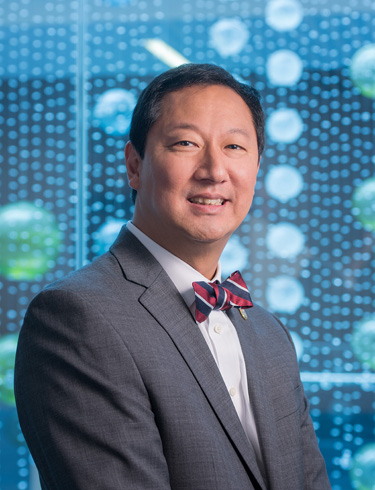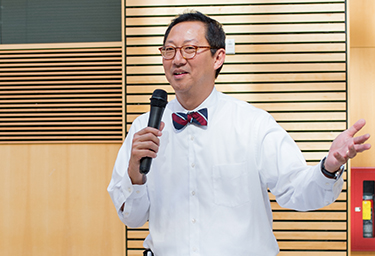As UBC President Santa Ono began his keynote address at the Department of Medicine’s annual Research Expo Nov. 9, speaking to students in the Experimental Medicine program, he couldn’t resist feeling nostalgic: His own career started in a very similar place, 32 years ago, in the Experimental Medicine program at McGill University.
“I remember being in your shoes when I had to give my presentation,” he told the students, fellows and faculty members of the Department of Medicine who had gathered in a lecture theatre at Vancouver General Hospital.
At McGill, he gravitated to research on Type 1 diabetes, trying to identify the genes that underlie the predisposition and susceptibility to that condition. From there, his career took him to Harvard, the Johns Hopkins University, University College London and Emory. Over the years, his research shifted to the pathophysiology of age-related macular degeneration, and his career expanded beyond his own research to academic leadership – as a Deputy to the Provost, a Senior Vice Provost, a Provost, and ultimately, a President, at the University of Cincinnati.
Now entering his fourth month as UBC’s president, Dr. Ono used the Department of Medicine’s Research Expo to share some of his initial impressions of the Faculty of Medicine and the university, and to impart some of his hard-won wisdom about scientific research. Here are a few excerpts from his speech:
I’m incredibly optimistic about the future of not only UBC, but research at UBC… We will not rest on our laurels. That is something I’ve made very clear to the Prime Minister’s Office, to the provincial government, that as one of Canada’s great universities, it’s really important that UBC move to an even higher level, as a key catalyst and engine for the knowledge economy of the future.
I need to personally understand what are the priorities for each faculty. And I need to understand what exactly are the steps that will be taken to move this institution, faculty by faculty, to a better place.
We’re very fortunate that we have [Dean of the Faculty of Medicine] Dermot Kelleher. In a very short period of time, he has made good progress to pave the way for an [Academic Health Sciences Network]. It’s something that’s going to be pivotal for the future of biomedicine in British Columbia. It’s not ideal, the way things are structured right now. The hard work he is doing in setting the table, in aligning organizations that really have to grow in the same direction to move us to the next level, is critical.
I was asked to give a few pieces of advice on how to build a successful research career. The first thing I want to say is follow your passion, and don’t be discouraged. Research is not easy, but it can be incredibly rewarding. There are those moments… when you can see something for the first time that no one else in the world has ever seen. There is no feeling like that. There will be those moments. Those moments of discovery make everything else worthwhile.
As you choose your experiments and you choose your next destination, you’ll talk to all kinds of people who you think are wise, and if you talk to 10 people you’ll get 10 different answers about what to do next. My advice to you is do all of that. But at the end of the day, when you’re thinking about what all of your options are and the experiments that you might do, really follow your gut and your passion. Don’t be scared to take a path that is not well-trodden. What matters is whether you are excited about what you are doing.
I was talking with a number of people who have spent time in Britain, about why so much innovation occurred there. And it wasn’t because of money. They actually had less money than in North America. A lot of people think it’s because there wasn’t a lot of money. It forced scientists at every level to really think very carefully whether or not the experiments they were doing were the right ones, or whether they were asking the right questions. Having also worked in the United States… I often found people were doing the experiments they thought they should do, the experiments that everyone else was doing. But that’s not very innovative.
In Britain, they take a lot of time in the afternoon to drink tea. They stop everything, whether they are structural biologists or biochemists or molecular biologists or immunologists, and converge and talk about experiments they are doing. It’s that kind of time, that you might think is a waste of time, when the magic occurs. The real innovation occurs in science at the boundaries of disciplines. Don’t be too busy to think, don’t be too busy to talk. Spend some time with people who are not in your laboratory, with people who are in a completely different faculty, because it’s there where you will really have that chemistry that will help you come up with something truly innovative.
A lot of people say, “I’m too busy to go to that lecture. It sounds interesting but I’m too busy.” Just as it’s important to make the time to come together with people who are maybe not like you or not thinking about the same things, it’s also important to make time to go to lectures and to hear about things that are totally different.
You’re surrounded by an amazing community of faculty members, students and postdocs. Don’t be shy to seek mentors or champions for your career. That’s one of the things I wished I had done as a graduate student or postdoc. Take a little bit of time to get to know other people. What will amaze you is that many people will welcome the opportunity to mentor you and talk to you about their lives, and many of them will go out of their way to help you in your future career. Don’t be shy. You’re in a community of scholars. We are here to help you.
One of the things I worry about the most is the wellness of our faculty staff and students. When I think honestly about my state of mind during those times as a graduate student or fellow, I wish I had spent a little bit of time taking care of myself, or a little bit of time taking care of my fellow graduate students in the lab, or faculty members who are under a lot of stress because of competitions for grants. If we all as a community care for each other more, it will pay tremendous dividends. No matter what stage you’re at, even if you’re a department chair, a first-year graduate student, an undergrad, a medical student, an MD-PhD student, let’s all commit to looking after each other’s wellness. One of the biggest drags on upward mobility, in an individual career or for an entire institution, is really wellness. So take time. Every now and then step off the treadmill. Take some time off. Play the cello. Walk around, go to the zoo. Take care of yourself, and take care of each other, because you are the most important asset of UBC – the people of UBC.

